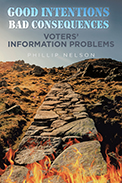
 |
In this time of political uncertainty in the United States, economist Philip Nelson presents a book to provide voters with what he believes is better information. Self-interest plays an important role in both market decisions and political choices, and Nelson argues that self-interest in voting leads to unintended consequences.
The reader will learn about the topics of liberal altruism, confirmation bias, naïve altruism, traditionalism, the role college professors and the media play in shaping voters’ political leanings, and the democratic ideal. He challenges readers to consider their reasons for voting and their altruistic leanings. Are they voting a certain way because they surround themselves with those who think and vote the same way as they do? How did their college professors influence their opinions on government expenditure? Do citizens support expenditure for altruistic improvements more when the beneficiaries are at a distance or in their own locality? How does confirmation bias affect a person’s policy views? Readers will hear a unique view on all these topics and will have much to ponder and discuss in the quest for better information.
They will also question their liberal bias throughout this book. The statistics of professors in various disciplines who vote a certain way certainly support the author’s hypothesis that free market academics tend to vote more conservatively. Further details on the sources of statistics, more visual representations of percentages (such as pie graphs), and other references supporting the information would only serve to enhance this thought-provoking read for those with a more visual learning style. The author’s pursuit of finding the truth for voters is noble, and readers will certainly finish this interesting book with a new lens with which to view the political climate.